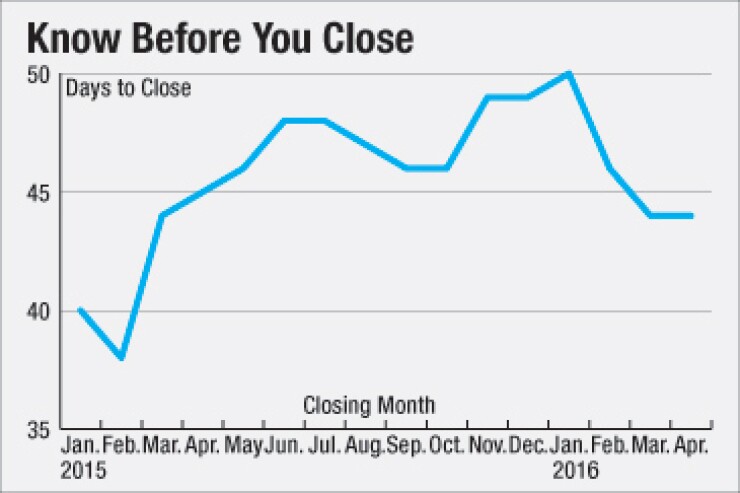

With the Consumer Financial Protection Bureau expected to clarify its TILA-RESPA integrated disclosure rules in July, one question that lenders, due diligence firms and investors look to have answered is how to remain compliant when unexpected changes come up right before a closing.
"Things happen in a closing you can't always anticipate," said Debbie Hoffman, chief legal officer at Digital Risk.
After eight months under the consumer protection bureau’s Truth in Lending Act and Real Estate Settlement Procedures Act integrated disclosures — known as TRID — the most frequent errors and questions are technical, she said.
But among their more substantive concerns, lenders and investors would like the CFPB to explain how they should handle a range of unexpected events that can occur after the initial Closing Disclosure but before closing, as well as errors discovered after closing.
"The hope is that [these issues] will be part of
CFPB guidance suggests Closing Disclosures can be used to address baseline changes occurring after the consumer receives the initial Closing Disclosure. But the law and CFPB staff commentary, both of which have a stronger legal standing than the written guidance, don't specify that this is possible.
The bureau is incorporating guidance it has already issued, such as through webinars and its compliance guide, into its regulation text and commentary. The CPFB is also conducting roundtable discussions, or "listening sessions," with groups of stakeholders to gain insight into their concerns, said Samuel Gilford, bureau spokesman.
Lenders and investors are less concerned about how to handle some of the more frequent changes in cost they tend to see after the consumer receives the initial CD, such as increases in recording fees, than they are about some big-ticket changes that they experience less frequently.
Investors and lenders also would like to know whether, if multiple CDs are issued, if they should be basing any cure on the second-to-last CD issued or the first one. Mid-America has found there are differing practices.
When the bureau's proposed clarification comes out in July, Lamphere would like to see it definitively state what the basis for comparison should be when there are multiple CDs.
"I understand what they want to do," she said. "They don't want a lot of changes up against closing because that isn't fair to the borrower — to have so many fee changes and they're so close to closing and they feel obligated. I get the intent, but we need a way to mitigate this."
Lenders often don't want to direct third parties to provide certain services until they know the loan is going to closing and they know those services are needed. But waiting also means the lenders might not know certain costs, such as how many pages of recording documents they need to pay for, until near the closing date.
"The thinking is that there is no need to cause an expense or for people to do work until you know they have to," said Jeff Bode, Mid-America CEO.
Ideally, the CFPB's proposed clarifications would also allow exceptions for more costly but unavoidable changes, such as an expired interest rate lock or an upward adjustment in a loan amount requested by the borrower, Lamphere said. But establishing a clear basis for comparison, without exceptions, could be an acceptable alternative.
Many mortgage businesses also would like the CFPB to clarify that they can make revisions outside of the 30-day post-consummation window for the CD when errors are discovered after that period, Lamphere said.
They would like to know how those changes can be cured, and they would like the clarifications added to documentation that will provide legal certainty.
Lenders have 30 days to cure a fee error or 60 days to cure a technical error, but there is some disagreement as to when the clock starts.
Under the older Truth in Lending Act, which along with the Real Estate Settlement Procedures Act forms the basis for TRID reform, the countdown would start from the date of discovery. But under the TRID language, it seems to start within 30 days of closing, Lamphere said.
Lenders think the language should be changed to clarify that if they do find a fee error after 30 days, they still have the opportunity to cure it within a specified period.
"It's very clear what you do from Day 1 to Day 30," Lamphere said. “It doesn't tell you what to do after that, and that's where we need the clarity."
The easiest solution — and the one that would make most sense, she said — would be for the CFPB to allow the lender or investor to cure the error, but pay interest based on how many days past 30 the error is discovered, which would encourage timely discovery of problems.
In addition to last-minute closing changes and errors discovered after existing deadlines, areas of TRID where lenders would like to see clarification include brokered transactions, where a loan in moved from one lender to another, and closing cost calculations on certain forms that are confusing to consumers.




